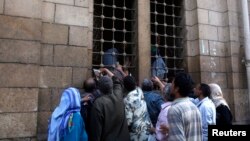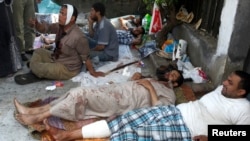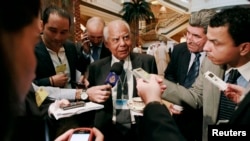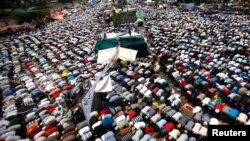CAIRO —
Egypt's interim rulers welcomed on Thursday remarks from the U.S. State department describing the rule of toppled leader Mohamed Morsi as undemocratic, clearly hoping they signaled Washington would not cut off its $1.5 billion in annual aid.
In a stark illustration of the desperate state of Egypt's economy, a former minister from Morsi's ousted government said Egypt has less than two months' supply left of imported wheat, revealing a far worse shortage than previously disclosed.
The army's removal of Egypt's first democratically elected leader last week, after millions took to the streets to protest against him, has left the Arab world's most populous country polarized by divisions unseen in its modern history.
Violence between supporters of Morsi and soldiers at a military compound this week has deepened the fissures.
Washington has been treading a careful line. U.S. law bars aid to countries where a democratic government is removed in a coup. So far Washington has said it is too early to say whether the Egyptian events met that description.
Nevertheless, State Department spokeswoman Jen Psaki said on Wednesday, Morsi's government “wasn't a democratic rule.”
“What I mean is what we've been referencing about the 22 million people who have been out there voicing their views and making clear that democracy is not just about simply winning the vote at the ballot box.”
Egypt's Foreign Ministry spokesman, Badr Abdelatty, said the comments “reflect understanding and realization... about the political developments that Egypt is witnessing in the recent days, as embodying the will of the millions of Egyptians who took to the streets starting on June 30 to ask for their legitimate rights and call for early elections.”
In the days before Morsi's downfall, the U.S. ambassador in Cairo attracted sharp criticism from Morsi's opponents for a speech that stressed that Morsi was democratically elected and discouraged street protests against him.
The White House on Monday refused to label the ouster of Egypt's president a military coup and said there would be no immediate cut-off in U.S. aid to Egypt. U.S. officials have since said they are still reviewing the matter. In the past, the U.S. government has taken more than two months to make up its mind on such questions.
Violence
Two and a half years of political turmoil has left Egypt on the brink of economic collapse, scaring away tourists and investors, shriveling hard currency reserves and threatening its ability to import food and fuel for its 84 million people.
Speaking to Reuters near midnight in a tent at a vigil by thousands of Morsi supporters, the ousted president's supply minister, Bassem Ouda, revealed that government stocks held just 500,000 tons of imported wheat.
Egypt, the world's biggest buyer, usually imports about 10 million tons of wheat a year, half of which is given out by the state in the form of subsidized bread sold for less than one U.S. cent a loaf.
The imported wheat stock figure, previously a closely-guarded secret, means Egypt will need to urgently start spending a $12 billion financial aid lifeline it has been given in the past two days by Saudi Arabia, the United Arab Emirates and Kuwait, rich Gulf states that welcomed Morsi's downfall.
Egypt had not bought any imported wheat since February, its longest absence from the market in years, until the eve of Morsi's downfall when it bought 180,000 tons.
The United Nations Food and Agriculture Organization said in a report that Egypt risked serious food security problems if insecurity and a shortage of foreign currency hinder imports.
“I think the aim of the Arab countries is to make sure Egypt doesn't fail with respect to food security and financial commitments with the international banking system, so I would think they will push to get the aid through quickly,” said Kisan Gunjal, economist and food emergency Officer at the FAO.
Road map
Adli Mansour, the interim president named by the general who removed Morsi, has moved briskly to implement an army “road map” to restore civilian rule. This week he announced a temporary constitution, plans to amend it and a faster-than-expected schedule for parliamentary elections in about six months.
He also named 76-year-old liberal economist Hazem el-Beblawi as interim prime minister. Beblawi held his first meetings with political leaders on Wednesday and told Reuters that he expects the transitional Cabinet to be in place early next week.
Negotiations are difficult, with the authorities trying to attract support from groups that range from secularists to ultra-orthodox Muslims, nearly all of whom expressed deep dissatisfaction with elements of the interim constitution.
Those political moves have been accompanied by a crackdown on the Brotherhood, the Islamist movement which worked in the shadows for 85 years before emerging as Egypt's best-organized political force when autocrat Hosni Mubarak was toppled in 2011.
On Wednesday, Egypt's public prosecutor ordered the arrest of Muslim Brotherhood leader Mohamed Badie and several other senior Islamists, accusing them of inciting violence on Monday when 53 Morsi supporters and four members of the security forces were killed in a dawn clash near a barracks.
Morsi's supporters say those killed were peacefully praying when fired upon. The army says terrorists provoked the violence by attacking its troops.
Morsi's whereabouts have not been revealed. The government says he is safe at an undisclosed location.
Thousands of Brotherhood supporters have maintained an around-the-clock vigil near a mosque in northeast Cairo demanding he be reinstated, an aim that now seems in vain.
The start of the Ramadan Muslim fasting month has done little to dampen the Brotherhood protest. Supporters are sheltering in tents from the summer heat during daylight hours when they are forbidden to eat or drink, and coming out in greater numbers in the evening.
They have called for protest marches on Friday, the Muslim prayer day, as has the anti-Morsi Tamarud group, raising the risk of more violence. Fighting between Morsi's supporters and foes killed 35 people last Friday, although the situation in Cairo and other cities has been calmer since Monday's clash.
Both sides in Egypt have become more anti-American in recent weeks. Morsi's opponents say President Barack Obama's administration supported the Muslim Brotherhood in power, while Morsi's supporters believe Washington was behind the plot to unseat him.
“Obama supports democracy, but only if it goes to those who aren't Islamists,” heavily bearded Morsi supporter El-Sayyed Abdel Rabennabi said at the Brotherhood vigil.
On Tahrir Square, where Morsi's opponents gather, the animosity is no less fierce.
“America made an alliance with the Brotherhood against the Egyptian people,” said aircraft mechanic Tawfiq Munir at a recent rally there. “Now the Brotherhood are fighting us in the streets, fighting to take back power, and America is sitting on the fence.”
In a stark illustration of the desperate state of Egypt's economy, a former minister from Morsi's ousted government said Egypt has less than two months' supply left of imported wheat, revealing a far worse shortage than previously disclosed.
The army's removal of Egypt's first democratically elected leader last week, after millions took to the streets to protest against him, has left the Arab world's most populous country polarized by divisions unseen in its modern history.
Violence between supporters of Morsi and soldiers at a military compound this week has deepened the fissures.
Washington has been treading a careful line. U.S. law bars aid to countries where a democratic government is removed in a coup. So far Washington has said it is too early to say whether the Egyptian events met that description.
Nevertheless, State Department spokeswoman Jen Psaki said on Wednesday, Morsi's government “wasn't a democratic rule.”
“What I mean is what we've been referencing about the 22 million people who have been out there voicing their views and making clear that democracy is not just about simply winning the vote at the ballot box.”
Egypt's Foreign Ministry spokesman, Badr Abdelatty, said the comments “reflect understanding and realization... about the political developments that Egypt is witnessing in the recent days, as embodying the will of the millions of Egyptians who took to the streets starting on June 30 to ask for their legitimate rights and call for early elections.”
In the days before Morsi's downfall, the U.S. ambassador in Cairo attracted sharp criticism from Morsi's opponents for a speech that stressed that Morsi was democratically elected and discouraged street protests against him.
The White House on Monday refused to label the ouster of Egypt's president a military coup and said there would be no immediate cut-off in U.S. aid to Egypt. U.S. officials have since said they are still reviewing the matter. In the past, the U.S. government has taken more than two months to make up its mind on such questions.
Violence
Two and a half years of political turmoil has left Egypt on the brink of economic collapse, scaring away tourists and investors, shriveling hard currency reserves and threatening its ability to import food and fuel for its 84 million people.
Speaking to Reuters near midnight in a tent at a vigil by thousands of Morsi supporters, the ousted president's supply minister, Bassem Ouda, revealed that government stocks held just 500,000 tons of imported wheat.
Egypt, the world's biggest buyer, usually imports about 10 million tons of wheat a year, half of which is given out by the state in the form of subsidized bread sold for less than one U.S. cent a loaf.
The imported wheat stock figure, previously a closely-guarded secret, means Egypt will need to urgently start spending a $12 billion financial aid lifeline it has been given in the past two days by Saudi Arabia, the United Arab Emirates and Kuwait, rich Gulf states that welcomed Morsi's downfall.
Egypt had not bought any imported wheat since February, its longest absence from the market in years, until the eve of Morsi's downfall when it bought 180,000 tons.
The United Nations Food and Agriculture Organization said in a report that Egypt risked serious food security problems if insecurity and a shortage of foreign currency hinder imports.
“I think the aim of the Arab countries is to make sure Egypt doesn't fail with respect to food security and financial commitments with the international banking system, so I would think they will push to get the aid through quickly,” said Kisan Gunjal, economist and food emergency Officer at the FAO.
Road map
Adli Mansour, the interim president named by the general who removed Morsi, has moved briskly to implement an army “road map” to restore civilian rule. This week he announced a temporary constitution, plans to amend it and a faster-than-expected schedule for parliamentary elections in about six months.
He also named 76-year-old liberal economist Hazem el-Beblawi as interim prime minister. Beblawi held his first meetings with political leaders on Wednesday and told Reuters that he expects the transitional Cabinet to be in place early next week.
Negotiations are difficult, with the authorities trying to attract support from groups that range from secularists to ultra-orthodox Muslims, nearly all of whom expressed deep dissatisfaction with elements of the interim constitution.
Those political moves have been accompanied by a crackdown on the Brotherhood, the Islamist movement which worked in the shadows for 85 years before emerging as Egypt's best-organized political force when autocrat Hosni Mubarak was toppled in 2011.
On Wednesday, Egypt's public prosecutor ordered the arrest of Muslim Brotherhood leader Mohamed Badie and several other senior Islamists, accusing them of inciting violence on Monday when 53 Morsi supporters and four members of the security forces were killed in a dawn clash near a barracks.
Morsi's supporters say those killed were peacefully praying when fired upon. The army says terrorists provoked the violence by attacking its troops.
Morsi's whereabouts have not been revealed. The government says he is safe at an undisclosed location.
Thousands of Brotherhood supporters have maintained an around-the-clock vigil near a mosque in northeast Cairo demanding he be reinstated, an aim that now seems in vain.
The start of the Ramadan Muslim fasting month has done little to dampen the Brotherhood protest. Supporters are sheltering in tents from the summer heat during daylight hours when they are forbidden to eat or drink, and coming out in greater numbers in the evening.
They have called for protest marches on Friday, the Muslim prayer day, as has the anti-Morsi Tamarud group, raising the risk of more violence. Fighting between Morsi's supporters and foes killed 35 people last Friday, although the situation in Cairo and other cities has been calmer since Monday's clash.
Both sides in Egypt have become more anti-American in recent weeks. Morsi's opponents say President Barack Obama's administration supported the Muslim Brotherhood in power, while Morsi's supporters believe Washington was behind the plot to unseat him.
“Obama supports democracy, but only if it goes to those who aren't Islamists,” heavily bearded Morsi supporter El-Sayyed Abdel Rabennabi said at the Brotherhood vigil.
On Tahrir Square, where Morsi's opponents gather, the animosity is no less fierce.
“America made an alliance with the Brotherhood against the Egyptian people,” said aircraft mechanic Tawfiq Munir at a recent rally there. “Now the Brotherhood are fighting us in the streets, fighting to take back power, and America is sitting on the fence.”








